These celebrations of our yesterdays can easily end up all camembert and wind. But while film people and television people will generally cock such things up, we do still have the odd cultural institution which can be relied upon to throw the right sort of party. For the National Theatre's golden jubilee, therefore, the stops were jolly well pulled out and the invitations damn well accepted from the actors who, striplings at the Old Vic in the Sixties, are now our own Oliviers and Ashcrofts and Scofields. And it was almost all impeccable.
Of course the greatest frissons were reserved for those moments when the veterans came back and did their piece once more with feeling – Judi Dench firing up as Cleopatra, Helen Mirren washing her thighs and despatching her husband in Mourning Becomes Electra, Maggie Smith spirited back into The Beaux’ Stratagem. Above all, Joan Plowright, long widowed and no longer sighted, returned to the stage of the Old Vic to repeat with heavy poignancy the words of St Joan she first spoke 50 years ago: “To shut me from the light of the sky… to make me breathe foul damp darkness”.
You’d get an intriguing idea of the history of musical theatre from the shows on show
And yet even if the actors were available, this wasn’t simply an exercise in carbon-copying the past. Penelope Wilton and Michael Gambon might easily have revisited Betrayal, but instead he paired up with Derek Jacobi to reincarnate Gielgud and Richardson in No Man’s Land (pictured below), and she with Nicholas Le Prévost for a slice of Ayckbourn’s Bedroom Farce. If the actors weren’t available, rather than do something else the parts were just recast from the company. Thus Arcadia was (rather uncertainly) peopled by new faces led by Rory Kinnear. Ralph Fiennes ferociously deputised for Anthony Hopkins as Lambert Le Roux. Rosalie Craig not Martine McCutcheon sang of the rain in Spain.
You’d get an intriguing idea of the history of musical theatre from the shows on show here: not just Lerner and Loewe and the inexhaustible Guys and Dolls (Nicely Nicely Johnson was shorn by time constraints of his traditional umpteen encores), but also the fleck and spume of Jerry Springer the Opera and the Ipswich sex worker serial killer musical London Road. And Dame Judi, trotting out “Send in the Clowns” one last time, still can’t hold a tune (no please don’t write in).
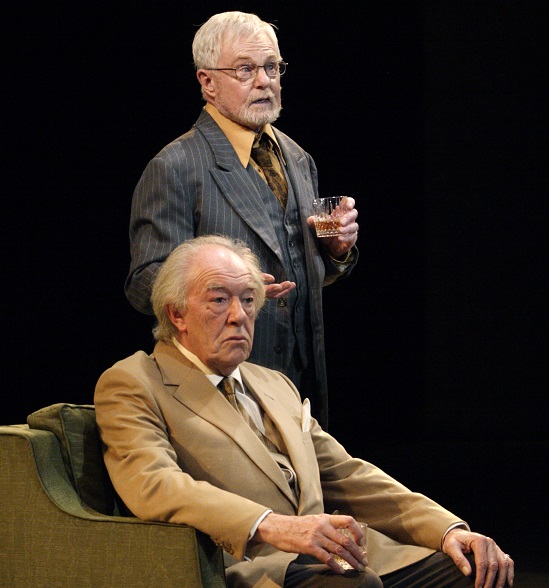 This was a compilation album with well-choreographed tonal shifts. Different buttons were pushed as James Corden beat himself up as Francis Henshall, Simon Russell Beale revisited his fiercely intelligent Prince of Denmark, and Joey the foal ballooned into a mighty stallion. And as the story of the National’s 50 years unfolded, a subtle hand was at work making connections between apparently random clips. We segued from one African queen to another as Cleopatra made way for a young gay man in Angels in America dying of Aids and missing his cat Sheba. Alan Bennett’s history boys, caught napping by the headmaster when playing at prostitution in a French class, pretended instead to enact a scene from a military hospital at Ypres. Straight after that the trenches were presaged for real in War Horse.
This was a compilation album with well-choreographed tonal shifts. Different buttons were pushed as James Corden beat himself up as Francis Henshall, Simon Russell Beale revisited his fiercely intelligent Prince of Denmark, and Joey the foal ballooned into a mighty stallion. And as the story of the National’s 50 years unfolded, a subtle hand was at work making connections between apparently random clips. We segued from one African queen to another as Cleopatra made way for a young gay man in Angels in America dying of Aids and missing his cat Sheba. Alan Bennett’s history boys, caught napping by the headmaster when playing at prostitution in a French class, pretended instead to enact a scene from a military hospital at Ypres. Straight after that the trenches were presaged for real in War Horse.
And for all the in-jokes about critics and actors, rarely did it feel like a self-indulgent orgy of nostalgia. We don’t know what Rufus Norris’s reign will bring, but this highlights package suggested that it’s high time for a revival of Peter Nichols’ The National Health as the NHS endures its latest growing pains, and possibly also for Pravda as the fourth estate endures moral and financial meltdown. It’s also time for Jacobi, a very early member of the National company at the Old Vic, finally to make his full Southbank debut, possibly in some Pinter.
Quibbles and caveats? As a television event it may have all looked quizzical to non-theatregoers. Filmed theatre has come on a treat since the arrival of swooping high-definition cameras, but stage and screen will never be entirely reconciled so long as actors quite properly see it as their first duty to hit the back wall of the upper circle. Two plays about politicians from David Hare felt like too many. Only one female playwright (Alecky Blythe) was simply not enough. And aside from Clive Rowe rocking the boat, it was quite a white night for lead performers until Adrian Lester came on at the death. His Othello neatly completed the circle, the Moor having been Laurence Olivier’s first role for the National, while making the point that the National and indeed the nation has moved on in half a century.
That’s why the line of the night belonged to Kobna Holdbrook-Smith as Guildenstern in Tom Stoppard’s debut play. “One is having one all the time,” he explained to Benedict Cumberbatch’s Rosencrantz, before clarifying: “A future.” See you at the theatre.
Overleaf: a gallery of images from 50 Years on Stage


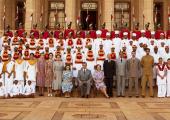
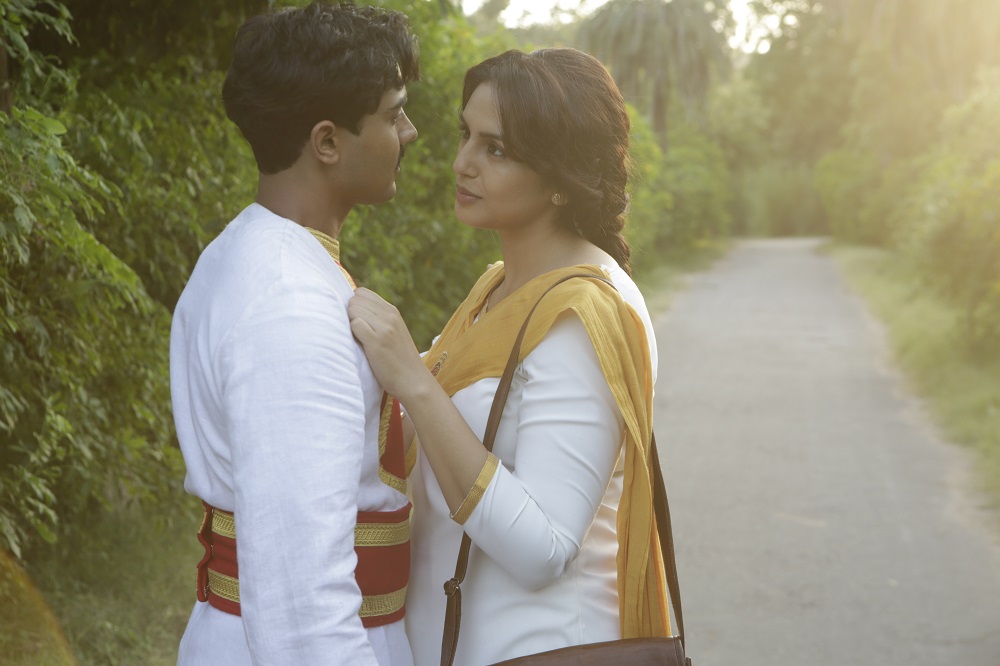 For budgetary reasons these larger events happen off camera or in newsreels, but the house itself is not cut off from the wider context. The liveried servants, the staff in the kitchen, the guards all have an urgent need to know what’s happening in the negotiations. Some yearn for an independent Muslim state, others are passionate for India to remain whole. Thus there’s a good deal of listening at keyholes and through cracks in doors.Chadha’s script, written with Paul Mayeda Berges, dramatises a nation’s agony in a story of thwarted love between two members of staff. Jeet Kumar, who is Hindu, falls for Aalia (Manish Dayal and Huma Qureshi, pictured above), the daughter of a former Muslim political prisoner (Om Puri). The problem is that Aalia is betrothed to one of her own, a soldier who hasn’t returned from the war. In the palace compound where they live tensions rise between communities, until the Muslim housing is torched.
For budgetary reasons these larger events happen off camera or in newsreels, but the house itself is not cut off from the wider context. The liveried servants, the staff in the kitchen, the guards all have an urgent need to know what’s happening in the negotiations. Some yearn for an independent Muslim state, others are passionate for India to remain whole. Thus there’s a good deal of listening at keyholes and through cracks in doors.Chadha’s script, written with Paul Mayeda Berges, dramatises a nation’s agony in a story of thwarted love between two members of staff. Jeet Kumar, who is Hindu, falls for Aalia (Manish Dayal and Huma Qureshi, pictured above), the daughter of a former Muslim political prisoner (Om Puri). The problem is that Aalia is betrothed to one of her own, a soldier who hasn’t returned from the war. In the palace compound where they live tensions rise between communities, until the Muslim housing is torched.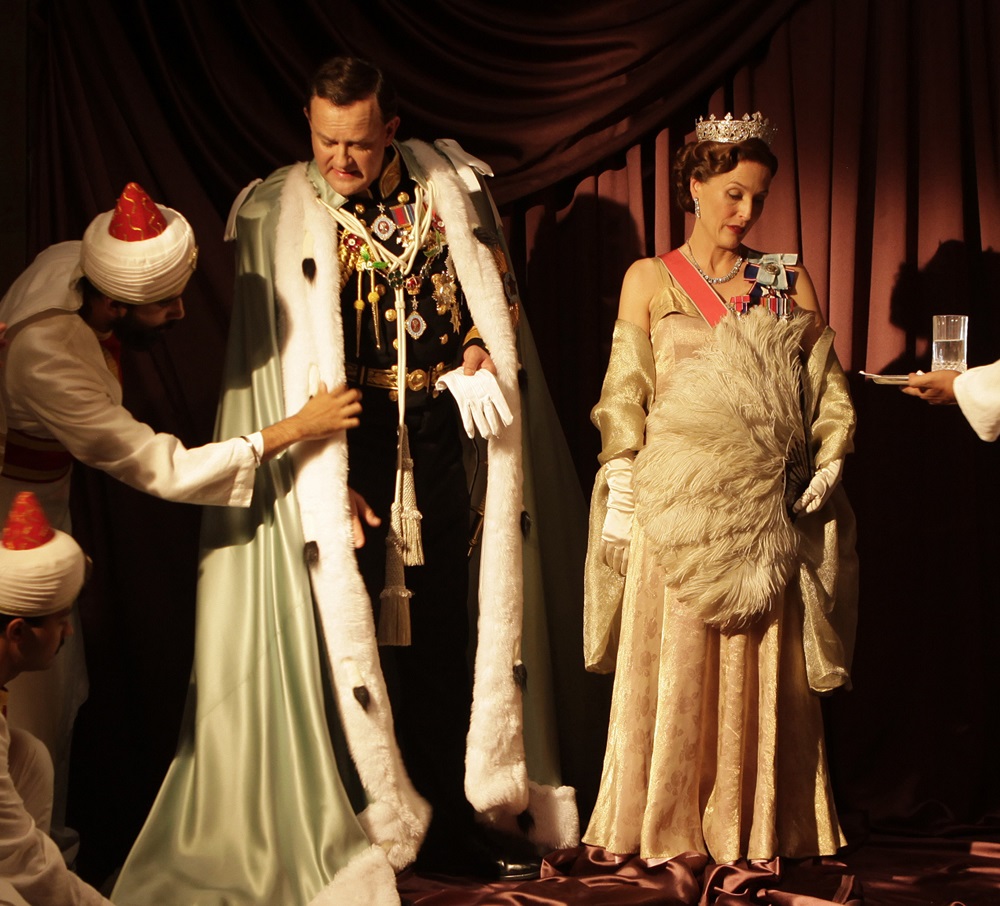 The film is very handsome to look at, and Chadha’s funny bones lay on plenty of light entertainment. But the laughs – and the sumptuous production values - feel like a sleight of hand distracting from the greater tragedy of India’s unseen agonies, which are mainly reported in dialogue between the higher-ups. Britain also gets a bit of a free pass as the architect of Partition. It falls to Michael Gambon as General Hastings Lionel Ismay, 1st Baron Ismay, KG, GCB, CH, DSO, PC, DL - "Pug" to his chums - to embody the nastier side of British realpolitik, while the Mountbatten family unit – and by implication the British establishment as a whole – is portrayed in the most flattering light.
The film is very handsome to look at, and Chadha’s funny bones lay on plenty of light entertainment. But the laughs – and the sumptuous production values - feel like a sleight of hand distracting from the greater tragedy of India’s unseen agonies, which are mainly reported in dialogue between the higher-ups. Britain also gets a bit of a free pass as the architect of Partition. It falls to Michael Gambon as General Hastings Lionel Ismay, 1st Baron Ismay, KG, GCB, CH, DSO, PC, DL - "Pug" to his chums - to embody the nastier side of British realpolitik, while the Mountbatten family unit – and by implication the British establishment as a whole – is portrayed in the most flattering light.
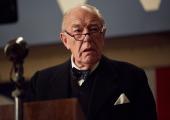

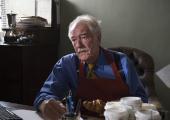



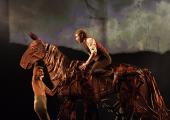
 This was a compilation album with well-choreographed tonal shifts. Different buttons were pushed as James Corden beat himself up as Francis Henshall, Simon Russell Beale revisited his fiercely intelligent Prince of Denmark, and Joey the foal ballooned into a mighty stallion. And as the story of the National’s 50 years unfolded, a subtle hand was at work making connections between apparently random clips. We segued from one African queen to another as Cleopatra made way for a young gay man in Angels in America dying of Aids and missing his cat Sheba. Alan Bennett’s history boys, caught napping by the headmaster when playing at prostitution in a French class, pretended instead to enact a scene from a military hospital at Ypres. Straight after that the trenches were presaged for real in War Horse.
This was a compilation album with well-choreographed tonal shifts. Different buttons were pushed as James Corden beat himself up as Francis Henshall, Simon Russell Beale revisited his fiercely intelligent Prince of Denmark, and Joey the foal ballooned into a mighty stallion. And as the story of the National’s 50 years unfolded, a subtle hand was at work making connections between apparently random clips. We segued from one African queen to another as Cleopatra made way for a young gay man in Angels in America dying of Aids and missing his cat Sheba. Alan Bennett’s history boys, caught napping by the headmaster when playing at prostitution in a French class, pretended instead to enact a scene from a military hospital at Ypres. Straight after that the trenches were presaged for real in War Horse.